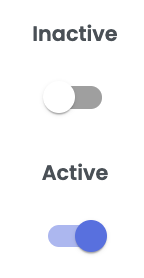Webhook Notifications
The Webhook Notifications page allows you to subscribe to API endpoints to listen for specific events and receive notifications about them.
The page is organized in the following six groups:
- Documents
- Variants
- Assets
- Links
- Classifications
- Processes
Quable PIM Events
For each group, the following events are available:
Entity | Event Type | Triggers |
|---|---|---|
Asset | media.create | |
media.update |
| |
media.delete |
| |
Classifications | classification.create | |
classification.update | ||
classification.delete | ||
Document | document.create | |
document.update | ||
document.delete |
| |
Links | link.create |
|
link.update |
| |
link.delete |
| |
Predefined Values | value.create | |
value.update |
| |
value.delete |
| |
Variants | variant.create | |
variant.update |
| |
variant.delete |
| |
Processes | bulk_edit.finish | |
import.finish | ||
export.finish |
Subscribe for Events
To start receiving webhook notifications, you must create a webhook.

First, do write a code for your configuration.
On the right, click on the slide switch for an event to change its status to Active.
Then, enter the URL for the appropriate endpoint to receive the notification(s).
Note: The URL entered must be an HTTPS endpoint.
Finally, you can use the Authorization Header text field.
You can specify a value that will be pushed into the Authorization header when calls are made from Quable to the URL you have just specified.
The value of this field is not used by Quable but passed on to your system. This can allow you to pass a key or token that your system will check for security purposes ...
Once you have entered all the information for the subscription(s), click the Save button to save your changes.
Disable Notifications
At any time, you can disable a webhook notification by clicking on an event's slide switch to change its status to Inactive.

Automatic deactivation
Multiple attempts and error handling
Each notification can be retried up to 3 times by our service.
After 3 unsuccessful attempts, the notification is considered to be in error.
There are several reasons for unsuccessful notifications:
- Our service does not receive a positive response (an HTTP response in 2xx)
- Our service does not receive a response within 5 seconds
Deactivation
The deactivation rule is based on a count of the number of errors, as follows:
Over the last 7 days, for 1 webhook notification profile, if we encounter more than 50 errors and the number of errors is greater than the number of successes, then the configuration is deactivated.
So if yesterday 50,000 notifications were successful, but today 100 notifications were considered to be errors, the webhook configuration will not be deactivated.
When the configuration is deactivated, an email is sent to the administrators.
Updated 5 months ago
